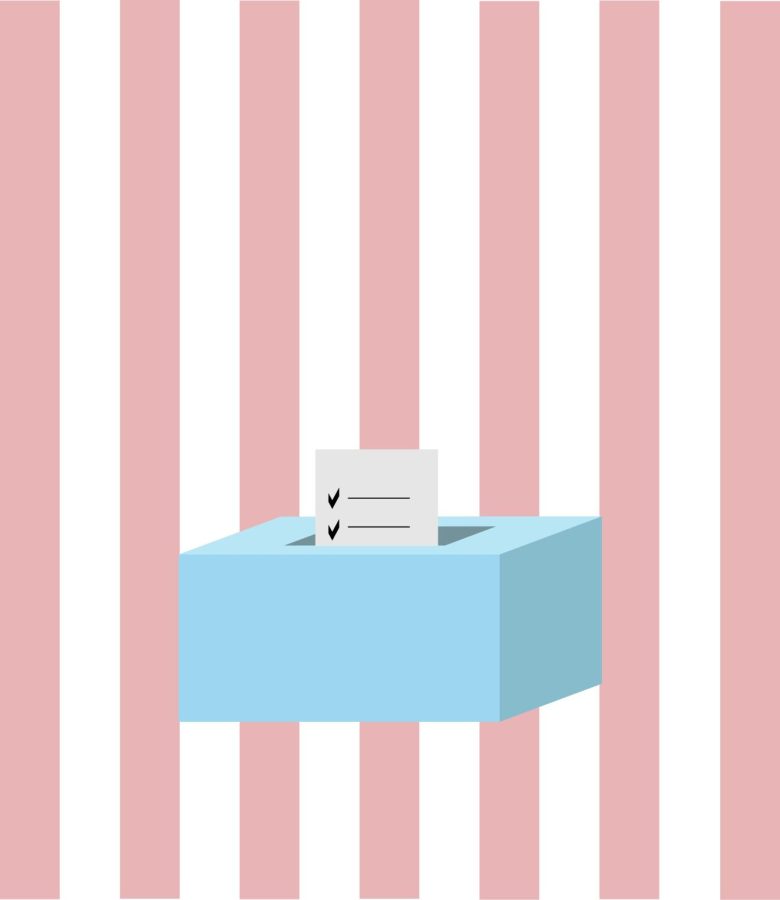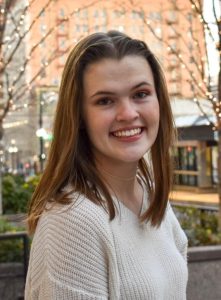Guest Opinion: Voting Is One Part in Our Fight for Change
(Graphic by Claire Peterson | The Daily Utah Chronicle)
February 25, 2022
College students across the nation broke voter turnout records in 2020 and the University of Utah was no exception. According to the National Study of Learning, Voting, and Engagement (NSLVE), the U’s voting rate went from 54% in the 2016 election to 58% in the 2020 election. Voter registration rates also went up by 4% and the U was awarded a Bronze Campus award from ALL IN Campus Democracy Challenge. So, how did we obtain record voter engagement in the midst of a pandemic that restricted in-person engagement?
While I cannot speak for the entire university, I can shed some light on the integral role that the Andrew Goodman Foundation Vote Everywhere chapter (AGF) played in creating a voter-friendly campus. From regular voter registration drives to primary election watch parties, AGF has worked to create opportunities that make civic engagement easier for busy students. One of our greatest accomplishments in the last few years is obtaining and maintaining a polling location on campus for non-presidential elections. In the past, the U only had a polling place for presidential elections. Now, the Marriott Library has hosted midterm, municipal and even primary elections. This increased accessibility to a polling place has increased voter turnout among students, according to our NSLVE data.
As a chapter of the Andrew Goodman Foundation Vote Everywhere program, we put all of this effort into student civic engagement because we, like the national organization, believe in the power that young people can wield as engaged citizens. Additionally, we find inspiration from Goodman himself as he and two others, James Chaney and Michael Schwerner, were murdered by the Ku Klux Klan for registering Black people to vote. Their murders provided political capital for the passage of the Voting Rights Act of 1965 a year later. It is this determination to ensure the right to vote for every citizen of the United States that encourages our work here at the U.
I have spent most of this letter espousing the importance of voting (and it is so important), but it is also important to recognize the barriers that exist. While issues such as identification and residency are barriers that our organization helps students navigate all the time, there are certain barriers that our efforts cannot tackle or even mitigate. When voters are gerrymandered out of their voices, they believe that their vote does not count, which can be harmful to not only our goals of increasing voter turnout but the very concept of democracy. Governing bodies that would choose to maintain their power rather than listen to their constituents and find solutions are antithetical to democracy.
As we face the gerrymandered maps resulting from 2020 census data, it is easy for disappointment, anger and hopelessness to cloud our perspective. The right to vote is continuously threatened as long as oppressive systems remain in place. Voting is immensely important, but if we want to protect the power that our votes hold, we must go beyond voting. Engaging in one’s community, creating relationships with elected officials and building systems of resistance are all effective ways to build people’s power. By standing up to oppressive systems and speaking out against injustice, we are able to protect our rights beyond the right to vote.
We have all been through a lot over the past year and a half — from the pandemic to marching for racial justice — and I feel your exhaustion. But I urge you to keep fighting. Find inspiration in the Utahns that traveled the state to get public input on fair maps. Find inspiration in people like Goodman, who risk their lives for the causes they believe in. Most importantly, find inspiration in yourself and your peers that broke voter turnout records despite uncertainty. We, as a civically engaged electorate, have the power to create the world we envision. Yes, it can start with voting, but it should not end there. Here’s to the power you hold.
— Lauren Harvey, President of the University of Utah’s Andrew Goodman Foundation Vote Everywhere Chapter
The Daily Utah Chronicle publishes guest op-eds written by faculty, elected officials, and other members of the public on topics relevant to students at the University of Utah. The Chronicle welcomes guest op-ed pitches here.








